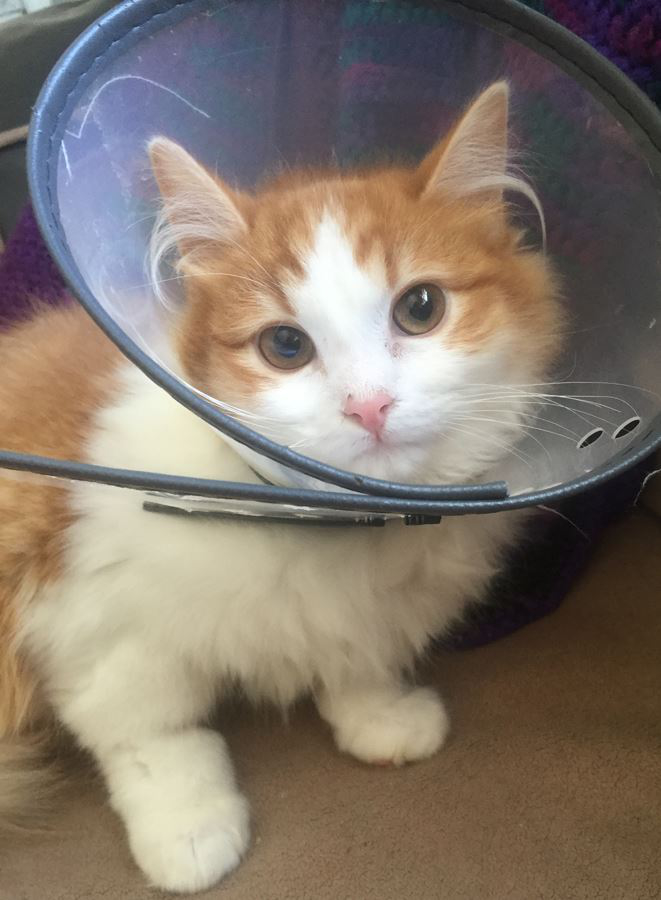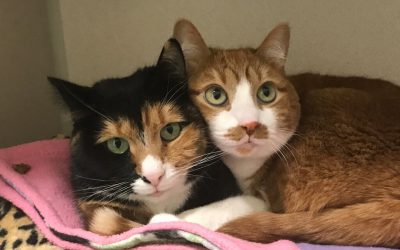Dear Ms Kitty,
It seems like my senior cat Gus is losing weight. He has also been vomiting more than usual. It’s hard to afford the vet right now, bbut is this serious enough I should take him in?
Concerned in Cascade
Dear Concerned,
Times are tough right now for most of us. It can be hard to justify spending money on veterinary care unless you know your cat really needs it.


A little illness can have a big negative impact, especially as Gus gets older. You are the best judge of when your kitty is a little off, as you know his body language better than anyone.
Keep in mind that many veterinary practices are just as overwhelmed as the rest of us during this pandemic. Many have shorter hours, more strict handling rules and possibly longer wait times.
Even though clinics usually reward loyalty with scheduling preferences, they may simply be unable to accommodate that right now. It’s best to stay in touch with your veterinarian and plan ahead as much as possible.
Here are some issues to look for when deciding whether to schedule that veterinary appointment:
Litterbox issues
A cat who goes outside the box is almost certainly not just mad at you. It can be his first cry for help. The first thing to check when a cat is going outside the box is to see if he has a urinary tract infection.
Breathing issues
While occasional coughing can be a response to dust, smoke or other allergens, shortness of breath can also be a sign of heart issues. If this symptom appears suddenly and strongly, please consider an emergency room visit unless your veterinarian can get you in quickly.
Vomiting
It’s not unusual for a cat to vomit occasionally, especially if he has any access to grass from outside or grown inside. The theory is that cats seek out fiber to clear out their systems.
As self-groomers, cats should also be producing occasional hairballs. It’s much healthier to see that hairball come up than try to work its way through the intestines where it might get stuck.
You can help Gus by finding a gentle grooming tool he likes and making that a happy experience by brushing without hurting him. Start with a simple comb and let him tell you when he’s finished to make grooming just an extension of happy cuddle time.
But if you see more vomiting than the occasional hairball, it may be time to seek medical attention. Gus could have the beginnings of kidney disease, or worse.
Diarrhea
As with vomiting, occasional diarrhea can be normal. Gus could have eaten something that disagreed with him, or have been exposed to transient stress.
Even occasional blood in the stool, especially with a too-fast food change, can be normal. A little slippery elm bark made into a syrup and hidden in a wet food treat can soothe his system and help get him back on track.
However, diarrhea that lasts more than a day or two can be a sign of something more serious, like food intolerance or allergies. If Gus is stressed enough the diarrhea is staying, it may be time to look at the causes and seek out behavioral help.
Vocalizing
Some cats just like to talk, and plenty of guardians encourage that by talking back. But if Gus has gotten a lot noisier than before, his hearing could be deteriorating. A deaf cat can be noisier and the sounds he makes harsher as he seeks to get the aural feedback he once had.You may not be able to do anything about his hearing loss, but if you know that’s the cause, you can respond by being more obvious in your own body language and trying to comfort him when he asks.
Weight loss
Just like us, it’s normal for cats’ weight to fluctuate a little. But if you can actually see or feel (hips are a good place to check) Gus getting thinner, it may be time for a checkup.
Older cats can develop thyroid issues. If his weight loss is accompanied by restlessness or being overly chatty, he may have an overactive thyroid. Hyperthyroidism is easily treatable if caught early.
Grooming
Cats are usually tidy creatures. They may need a little assistance, but usually take care of their coats with self-grooming.
If your cat’s fur starts to look different, whether it’s greasy or spikey or more matted, pay attention. This can be a symptom of many things that can affect his mouth, teeth or saliva, as well
Thirst
If you notice Gus is spending more time at the water bowl, he might need some testing, as excess thirst can be a symptom of impending kidney disease or diabetes. The earlier these diseases are caught, the more quickly Gus can be treated for them.
Lethargy
Whatever Gus’s usual level of activity, if he suddenly acts more listless or retreats from normal activity by hiding or sleeping more, you may want to monitor him. Like us, cats may tuck away when they don’t feel well.There could be a serious illness brewing or he could be reacting to stressful changes in his environment. Either way, it may be time for a vet visit or a chat with a cat behavior professional.
Sara Ferguson is the Director of Happy Cats Haven and Carole Galloway is the owner of Colorado Cats Boarding. Ask Ms Kitty supports cat behavior consulting offered on our website through our Helpline.




